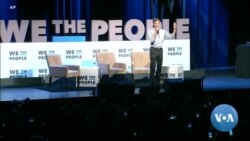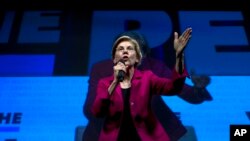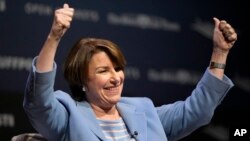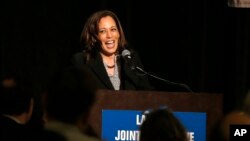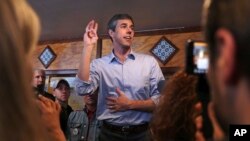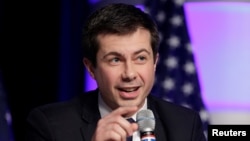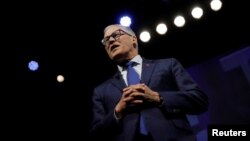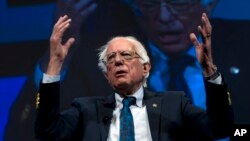It will be 10 months before U.S. voters begin the process of choosing a Democratic Party presidential nominee through the caucuses and primary elections that get underway in February of next year. But already 15 or more Democrats are busy campaigning to be the one to take on President Donald Trump next year.
The 2020 Democratic field is a diverse mix of women, men, minorities and contenders with varying levels of political experience.
In Washington this week, several Democratic presidential contenders auditioned for support before union and liberal activist groups at the “We the People” forum.
“The Trump administration is a walking, talking, living, breathing threat to national security, and we just have to call it out,” said Massachusetts Senator Elizabeth Warren to cheers from the audience.
Warren is one of several women candidates in the field who do not hesitate to criticize President Donald Trump, a group that includes Minnesota Senator Amy Klobuchar.
“He somehow thinks that organized hate is more powerful than unorganized love. Well, maybe he’s right. But how do we respond to that? We organize, right! We organize and we win,” vowed Klobuchar.
Diverse field
Several minority candidates have also stepped up to the 2020 stage, including California Senator Kamala Harris, former cabinet secretary Julian Castro and New Jersey Senator Cory Booker, who often focuses on national unity as a theme.
“This election will be more than just taking one person out of office. This will be the beginning of the next era of America where dreams are not just words or songs but a reality for all!”
Unity is also a theme for former Texas congressman Beto O’Rourke, who officially announced his candidacy in his hometown of El Paso.
“Let those differences not define us or divide us. Let us agree going forward that before we are anything else, we are Americans first!” he said.
O’Rourke told Monday’s “We the People” forum that he would support eliminating the electoral college system for choosing a president, and would favor a direct popular vote instead to decide the outcome.
Poll surges
O’Rourke has risen into double-digit support in some recent polls. Other newcomers who have seen poll surges are South Bend, Indiana, Mayor Pete Buttigieg and California Senator Kamala Harris.
The latest Quinnipiac University poll had former Vice President Joe Biden leading the Democratic race at 29 percent support, followed by Vermont Senator Bernie Sanders at 19 percent, O’Rourke at 12 percent and Harris at 8 percent.
In a recent Emerson poll of Iowa voters, Buttigieg had surged into third place with 11 percent support, trailing only Biden and Sanders and slightly ahead of Harris and Warren.
Biden is expected to join the race soon but is under fire after complaints from several women about unwanted close physical contact. On Wednesday, the former vice president posted a video on Twitter noting that “the boundaries of protecting personal space have been reset.” Biden added that he will be more “mindful about respecting personal space in the future.”
Biden is considered by many Democrats to be the front-runner but his lack of success in two previous campaigns has some party activists wary.
Scrutiny already
Given the intensive early candidate travel to key early voting states such as Iowa and New Hampshire, Democratic activists are already scrutinizing the contenders.
“Democratic voters are basically interviewing candidates on two topics,” said American University expert Bill Sweeney. “First and most importantly is their policy vision for the United States in the years ahead. And then secondly, are they the person to beat Trump in the 2020 election?”
Some of the newcomers to the national stage tend to focus on one or two key issues. In the case of Washington State Governor Jay Inslee, that issue is climate change.
“It is a unique moment because we are the first generation to feel the sting of climate change, and we are the last generation that can do something about it,” Inslee told the Monday forum in Washington.
Despite all the newcomers in the 2020 mix, the one familiar face from the 2016 campaign is Bernie Sanders.
Sanders is once again offering bold promises on expanding the role of government in health care, free college education and economic fairness.
“And what I pledge to you, if elected president, is to be a president that will be traveling all over this country as part of a grass roots political movement,” Sanders told the “We the People” forum.
Sanders got some encouraging news this week. His fundraising totals for the first quarter of this year topped $18 million, leading the Democratic field. On Wednesday, O’Rourke reported that he has raised $9.4 million in donations during his initial period of campaigning, another sign he could be a contender with staying power.
Other top fundraisers included Harris who reported a $12 million haul and Buttigieg raised $7 million, an impressive total for someone virtually off the radar just weeks ago.
Lots of choices
With the final total of contenders likely to be somewhere between 15 and 20, Democratic activists will have plenty of different personalities and governing philosophies to choose from, said George Washington University analyst Matt Dallek.
“Do primary voters want someone who is not going to be a centrist like Bill Clinton? Who is not going to be as cautious as former President Obama? Who is really going to tackle income equality as the central issue?” he said.
For his part, President Trump says he is eager to take on whomever the Democrats nominate next year.
“We could lose the country, we really could. Because these people are stone cold crazy,” Trump told a Republican fundraiser in Washington on Tuesday.
The first big test in the Democratic race will come in the first candidate debates to be in Miami, June 26 and 27.




